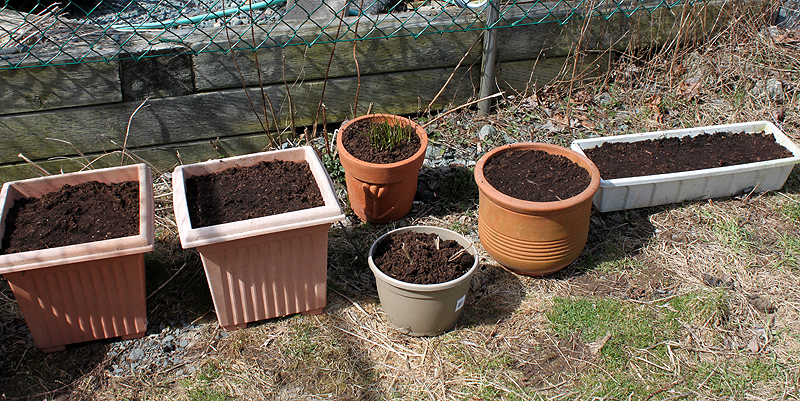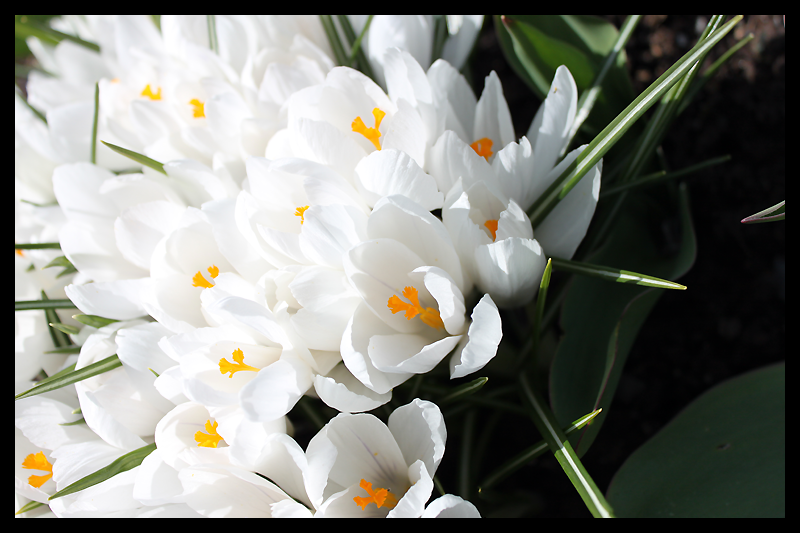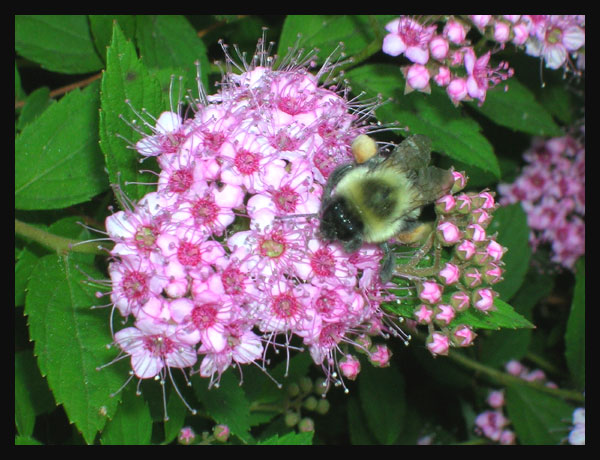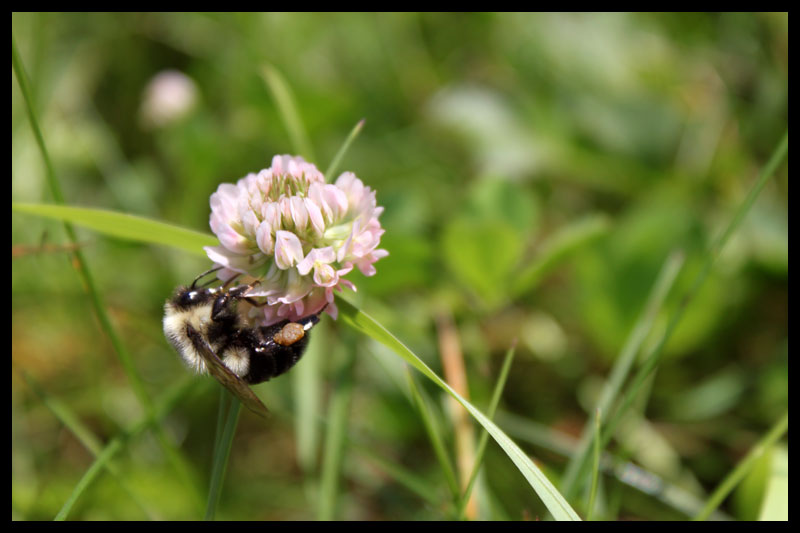Over at my parents house with Casey today - the crocuses are in bloom! Bees are out pollinating, the sun is shining - it's a nice day!
Showing posts with label Gardening. Show all posts
Showing posts with label Gardening. Show all posts
Monday, April 22, 2013
Sunday, April 21, 2013
Gardening officially begins!
This year, most of the seeds I bought are early spring starters, so since it was a lovely sunny day earlier this week, I went for it!
Its hard renting a home and not being able to make a proper garden. :/ But I'll have to continue to be content with container gardening, as long as I've kept my goals realistic. I chose mostly flowers this year, but I'm sure to end up with more veggies as the spring progresses - my folks always buy extra and give me some. :)
I wanted to plant Bachelor's buttons last year, but I didn't get seeds until it was quite far into the season, and when they sprouted, they were devoured almost immediately by bugs. There's a reason for following the planting times on seed packets - not only the weather is appropriate, but the bugs that would feast on particular plants aren't around until the plant is properly established. So this year I bought them in February :D.
I'm planting a display of Bachelor's Buttons interspersed with California poppies. The mostly blue buttons and mostly red poppies will make a gorgeous combo. They're the same growing height too, so they go together naturally.
My mother's mom (my Baba) used to grow Calendulas. We had them for many years growing up, it was one of the first flowers I was able to identify because it was so common at home. Their unique, large, curved seeds were fun to gather as a child. I chose some large Calendulas to grow this year, a lovely pale yellow. They'll be grown in the back of the same pot as Night Scented Stocks. I grew them as a teenager at home and never forgot them. How delightful to go out in the late evening and smell their amazing perfume!
For veggies, I still have my garlic that I planted last fall (the best time to plant--mulch well and they are ready to pick in early summer!). I planted quick growing crops this year - green onions (scallions) and radishes. I still have to plant the potatoes I have sprouting in my kitchen right now though! I think I need another pot... :)
Should make a nice display, and leave me some little things to add to my diet. :)

Its hard renting a home and not being able to make a proper garden. :/ But I'll have to continue to be content with container gardening, as long as I've kept my goals realistic. I chose mostly flowers this year, but I'm sure to end up with more veggies as the spring progresses - my folks always buy extra and give me some. :)
I wanted to plant Bachelor's buttons last year, but I didn't get seeds until it was quite far into the season, and when they sprouted, they were devoured almost immediately by bugs. There's a reason for following the planting times on seed packets - not only the weather is appropriate, but the bugs that would feast on particular plants aren't around until the plant is properly established. So this year I bought them in February :D.
I'm planting a display of Bachelor's Buttons interspersed with California poppies. The mostly blue buttons and mostly red poppies will make a gorgeous combo. They're the same growing height too, so they go together naturally.
My mother's mom (my Baba) used to grow Calendulas. We had them for many years growing up, it was one of the first flowers I was able to identify because it was so common at home. Their unique, large, curved seeds were fun to gather as a child. I chose some large Calendulas to grow this year, a lovely pale yellow. They'll be grown in the back of the same pot as Night Scented Stocks. I grew them as a teenager at home and never forgot them. How delightful to go out in the late evening and smell their amazing perfume!
For veggies, I still have my garlic that I planted last fall (the best time to plant--mulch well and they are ready to pick in early summer!). I planted quick growing crops this year - green onions (scallions) and radishes. I still have to plant the potatoes I have sprouting in my kitchen right now though! I think I need another pot... :)
Should make a nice display, and leave me some little things to add to my diet. :)

Thursday, March 21, 2013
Local bees best?
I've heard several theories regarding bee colony collapse - a fungal infection, bees having an adverse reaction to GMOs, and the common practice of packing up and moving bees between fields and farms for mass pollination of one crop at a time leaving the bees with severely weakened immune systems (because it's natural to take pollen from several types of flowers -- you'd get sick too if all you ever ate for 3 days was asparagus, then candy for 3 days, then bread for another 3, etc.).
Connecting with this last point, they've done a study that says the "wild" bees (as opposed to the bees brought in for the mass pollination described above), actually do a better job of helping the plant reproduce, as "imported" bees tend to result in more plant inbreeding.
They're now recommending that farms leave more untouched wilderness around their fields for "local" bees and other pollinators to live in, get a balanced diet in, and stay healthy.
Bees are a vital link in the food chain, their importance cannot be overestimated.
We've certainly enjoyed watching the many different type of pollinators, mini and bumble bees and more, since we let our backyard go "natural", it's full of long grasses, bluets and strawberries in the spring, clover and thistle in the summer, and goldenrod in the fall.
Read more about wild bees and this latest study on the CBC.
Connecting with this last point, they've done a study that says the "wild" bees (as opposed to the bees brought in for the mass pollination described above), actually do a better job of helping the plant reproduce, as "imported" bees tend to result in more plant inbreeding.
They're now recommending that farms leave more untouched wilderness around their fields for "local" bees and other pollinators to live in, get a balanced diet in, and stay healthy.
Bees are a vital link in the food chain, their importance cannot be overestimated.
We've certainly enjoyed watching the many different type of pollinators, mini and bumble bees and more, since we let our backyard go "natural", it's full of long grasses, bluets and strawberries in the spring, clover and thistle in the summer, and goldenrod in the fall.
Read more about wild bees and this latest study on the CBC.
Saturday, March 31, 2012
No Bees = No Food
Another link in the chain has been discovered in the mystery surrounding the seemingly world-wide collapse of beehive colonies. A particular type of pesticide that was developed to be less damaging to humans and mammals apparently affects the bees so they are unable to return back to the beehive, reducing populations and making them extra susceptible to stresses that can collapse the whole colony.
CNN has an article discussing the latest studies. Once again it's come to light that pesticides may save crops from one threat, but we are creating new problems in return...
CNN has an article discussing the latest studies. Once again it's come to light that pesticides may save crops from one threat, but we are creating new problems in return...
Sunday, January 01, 2012
Happy 2012!
Hope everyone had a fun New Year's eve! :) Thought I'd start the new year off here with a cute story from the BBC, how a woman in Sweden found her lost wedding ring 16 years later, in a most peculiar (and gardening-related) way!
Find out here! http://www.bbc.co.uk/news/world-europe-16374283
Happy New Year!
Find out here! http://www.bbc.co.uk/news/world-europe-16374283
Happy New Year!
Friday, August 12, 2011
Summer....
The weather was not what we were promised. They said it was going to be uncharacteristically hot this summer, but instead we were hit with one cloud bank after another after another. Aside from a brief period of sun in July, it's just been a sad continuation of the awful weather we had all spring.
Today, mercifully, was a beautifully sunny break from all that rain. Got some bedsheets out on the line, enjoyed the sun with my girls, and took a few snaps to boot.
We have seen a few more bees this last month, but it's been nothing like the amount we had last year. At least *some* flowers and plants are getting pollinated!
I'm still so deeply impressed/interested with the true Queen Anne's Lace, the wild carrot, daucus carota. They're just so lovely, and their seedheads provide even more interest come fall and winter! (More on that another time!) :)
Here's hoping for more sunshine, soon!
Today, mercifully, was a beautifully sunny break from all that rain. Got some bedsheets out on the line, enjoyed the sun with my girls, and took a few snaps to boot.
We have seen a few more bees this last month, but it's been nothing like the amount we had last year. At least *some* flowers and plants are getting pollinated!
I'm still so deeply impressed/interested with the true Queen Anne's Lace, the wild carrot, daucus carota. They're just so lovely, and their seedheads provide even more interest come fall and winter! (More on that another time!) :)
Here's hoping for more sunshine, soon!
Labels:
ann's photos,
environmental issues,
Gardening,
life in Canada,
ns fauna,
ns flora
Monday, July 04, 2011
Bees? Any bees?
It has been a terrible spring weather-wise here in Nova Scotia. From March - June, we had maybe 5 days of sun per month (and frankly, I think I'm being generous). Other than that, its' been cloud, rain, fog, or a combo of all. My tomatoes were hardened off for 3 weeks because nights were still getting so cold.
I noticed that even after the clover started blooming, I can count on one hand the number of bees I've seen so far this summer. I'd hoped it wasn't colony collapse or anything like that; it turns out that bees hate the bad weather more than we do! The constant rain means bees stay in their hives, getting cranky and eating stored honey instead of producing new.
The CBC has an article on the lack of honey this year so far:
http://www.cbc.ca/news/canada/nova-scotia/story/2011/07/02/ns-honey-bee-production-down.html
I'm just hoping I get enough bees to pollinate my tomatoes! I might have to do it myself... :)
I noticed that even after the clover started blooming, I can count on one hand the number of bees I've seen so far this summer. I'd hoped it wasn't colony collapse or anything like that; it turns out that bees hate the bad weather more than we do! The constant rain means bees stay in their hives, getting cranky and eating stored honey instead of producing new.
The CBC has an article on the lack of honey this year so far:
http://www.cbc.ca/news/canada/nova-scotia/story/2011/07/02/ns-honey-bee-production-down.html
I'm just hoping I get enough bees to pollinate my tomatoes! I might have to do it myself... :)
Saturday, January 22, 2011
Natural Farming
I've been coming across a lot of information on this style of farming lately. Today, via Reddit, I found this article on Natural Farming practices in Hawaii - and before that, I read up on Fukuoka's "One Straw Revolution" which he started back in the 1070s. (Also read Mother Earth News' article on Building Fertile Soil). These and others are advocating less human intrusion in the growing process, and allowing nature (and soil microbes/worms/etc) to do the majority of the work. There are only a few times in the growing cycle that humans need to be involved in, but they must be done at just the right time and the right way, for the crops to be successful. It's very specific to each region as well - the methods and cycle that work in one area is not really directly transferable to other areas - so you have to take the ideas and adapt them to your local area.
I really love the idea of stepping away from the process and allowing this underground network to do most of the "heavy lifting". And best of all, this is a "no-till" system! It's a rather radical change from the way we've been doing farming, but with comparable yields to modern farming and NO pesticides, it seems to be something really worth looking at! Check out those articles, they're great reads.
I really love the idea of stepping away from the process and allowing this underground network to do most of the "heavy lifting". And best of all, this is a "no-till" system! It's a rather radical change from the way we've been doing farming, but with comparable yields to modern farming and NO pesticides, it seems to be something really worth looking at! Check out those articles, they're great reads.
Labels:
environmental issues,
Gardening,
Urban Homesteading
Subscribe to:
Posts (Atom)






 The Family
The Family